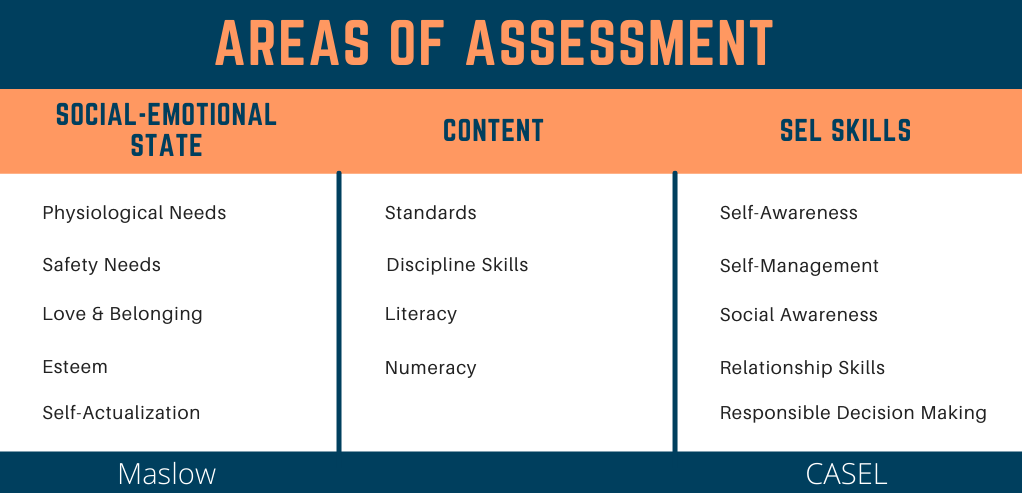Assessment gets a bad rap. Volumes of books have been written over the years about assessment, but sometimes we overthink it. Assessment is a natural human behavior where we observe and evaluate situations or people. We all judge from a very young age and are doing it all of the time (you are judging my writing skills, or lack of them right now). Then we adjust our actions based on our assessments. When someone is angry, you either try to avoid them or placate them. Unless you are a glutton for punishment, you don’t try to make them more upset.
When it comes to education, assessment is most often associated with standardized testing. Collective “Ugh.” But assessment should be viewed as a much wider category of actions. There are 3 areas that teachers should be assessing continuously.

Social-Emotional State
The social-emotional state of students has become the trendy thing to focus on during Covid. Maslow before Blooms is the battle cry of teachers everywhere. While I contend that we can Maslow while we Bloom, I do agree that we need to build relationships with kids and make sure that they are physically and mentally prepared to learn both content and SEL skills before we engage with them. We should be continually taking stock of students’ mental state, energy level, and sense of confidence.
This is best achieved by checking in with each student daily. Whether you are greeting them at the door (or as they enter a virtual space) or just chatting with them during work time, every student needs to be personally acknowledges. It doesn’t need to be a lengthy or formal process, but more a culture of belonging. When one or more students are not prepared to learn, for any reason, address it first. This may be as simple as letting a student rest when tired or not feeling well, or sending them to a counselor if they are very distraught.
Content
Content was the only focus during NCLB. From teacher and principal evaluations to school “grades,” everything was based on improving test scores. While the pendulum swung too far in this direction, we don’t want to throw out the baby with the bath water. Content is still a critical part of our jobs. Through PBL, there are a myriad of ways to assess content beyond standardized multiple choice tests. Portfolios of student work from prototype to final products mixed with student reflections are an excellent window into their content knowledge and ability to apply it.
Social and Emotional Learning Skills
Social and Emotional Learning Skills are the trend of the future, partially in reaction to the over-obsession of content associated with standardized curriculum and testing. SEL goes beyond checking students mental state for trauma, to cultivating the SEL competencies into their lives. SEL skills are vital to successful careers and meaningful relationships, presenting a holistic approach to learning.
In reality, these three areas are not distinct but interwoven with each other. The Esteem and Self-Actualization of Maslow overlap with the Self-Awareness and Self-Management of CASEL. All of the SEL competencies develop skills that lead to greater academic success in the content areas, including literacy and numeracy. The discipline specific skills of each content area are dependent on problem-solving, analyzing, and evaluating.
Always Formative
The largest shift isn’t from content to SEL (since both still matter), but from summative to formative. We know that one test score never represents the totality of what an individual knows. So we need to hold off on summative assessments for as long as possible and treat everything as a formative part of the learning process. This often means not putting a grade on student work but giving feedback in multiple forms leading to refinement by the student.
Everything in the classroom is a formative assessment opportunity.
We just have to view it that way. From conversations and observations to protocols, routines, scaffolds, and the structures of PBL, everything informs us in one or more of the three areas of assessment if we are paying attention.
The reason that we assess in the first place is to adjust our teaching plans to our student needs. That’s why grading feels so senseless. It is often reporting scores for the purpose of ranking and sorting. But assessment is like a thermostat. We take the temperature of the room and then we adjust to the needs of our students. Ultimately the purpose of formative assessments is to help students drive their own independent inquiry.
For example, let’s say many students aren’t participating in class. A traditional approach might be to start grading them with participation points, but that doesn’t fit into any of the three categories. Even worse, participation points reward the kids who were already working and punish the ones who weren’t, but they don’t inspire anyone. Instead assess the reasons that students aren’t participating. Are they bored, shy, or intimidated due to low skill level? What strengths are they “hiding” in class? Then design projects based on their strengths that develop their gaps. Formative assessments are our opportunity to know our students at a deep level and encourage them to become their best selves.
Questions? Interested in a PBL workshop or consulting? Connect with me at michaelkaechele.com or @mikekaechele on Twitter.


Pingback: Sharing Diigo Links and Resources (weekly) | Another EducatorAl Blog